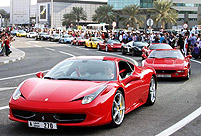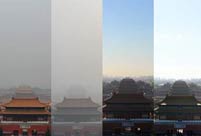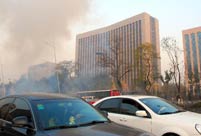Many believe the best way of avoiding pollution is to stay indoors. So when the world's biggest shopping mall, the New Century Global Center - a building large enough to accommodate 20 Sydney Opera Houses inside - opened in Chengdu in September, some netizens were thrilled that they could free themselves from the air pollution. Shoppers there could even warm themselves under its round-the-clock artificial sun.
Normally, on a polluted day, children and elderly people are urged to stay indoors with their windows closed. However, some experts point out that the indoor danger is as prevalent as it is outdoors. Little research had been done on indoor air quality until last year. The Beijing Center for Disease Control and Prevention (CDC) launched a three-year project to study levels of indoor exposure to PM2.5 and its impact on people's health.
It said the project will analyze the air samples taken in different indoor locations including offices, schools, hotels and hospitals, and then study the correlation between the density of indoor PM2.5 and the external surroundings. The results will then be used to draft the city's public health policies.
Heightened awareness
One month after coming back to China from the US this August, 24-year-old Lucy Liu said she began experiencing symptoms such as irritation of the nose and throat and coughing.
"The doctor could not figure out what was wrong. After I told him I had just come back from the States, he said it was probably because of the pollution," Liu told the Global Times.
Liu is not the only one who feels under the weather. Last month, Grammy winner Patti Austin canceled her performance in Beijing after suffering an asthma attack. Many believe it was linked to the heavy smog that blanketed Beijing that day. Since then, Liu said she has started improving the air quality at home.
"That is probably the only thing I can do to help myself," she said.
There are many different kinds of particulate pollutants in homes and offices, including those from outside and those caused by indoor activities such as smoking.
"Our Chinese cooking styles also contribute a lot to PM2.5 density. We hope Beijing citizens cooperate with us and work with the government to clean the air," said Zhao Huimin, director of Beijing's Foreign Affairs Office, in an interview last month.
His remark soon triggered public anger as many believe the government is trying to shift the responsibility away from itself. Some netizens joked that the government could set up another lottery system to decide who can cook on what day, in an allusion to the way car license plates in the city are distributed.
"I didn't know cooking at home could increase PM2.5. Now I have to wear a mask when I cook," a Beijing housewife surnamed Zhao joked with the Global Times.
Worried that eating out might expose them to unsafe food and poisoned air, Zhao often cooks at home. Now it seems that cooking at home is not any safer, she has decided to upgrade her exhaust fan.
The desire for cleaner indoor air has become a new selling point for electrical appliances such as exhaust fans and air purifiers as the pollution worsens.


 Luxury-cars parade held in Dubai
Luxury-cars parade held in Dubai Special forces take tough training sessions
Special forces take tough training sessions Fire guts 22-storey Nigeria commercial building in Lagos
Fire guts 22-storey Nigeria commercial building in Lagos A girl takes care of paralyzed father for 10 years
A girl takes care of paralyzed father for 10 years A record of Beijing air quality change
A record of Beijing air quality change In pictures: explosions occur in Taiyuan
In pictures: explosions occur in Taiyuan Live a harmonious life in Pu'er, SW China
Live a harmonious life in Pu'er, SW China Weekly Sports Photos
Weekly Sports Photos Gingko leaves turn brilliant golden yellow in Beijing
Gingko leaves turn brilliant golden yellow in Beijing Maritime counter-terrorism drill
Maritime counter-terrorism drill Loyal dog waits for master for six months
Loyal dog waits for master for six months The catwalk to the world of fashion
The catwalk to the world of fashion  China in autumn: Kingdom of red and golden
China in autumn: Kingdom of red and golden National Geographic Traveler Photo Contest
National Geographic Traveler Photo Contest Living in an urban village: 'Iron-digger' Xiong Sansan
Living in an urban village: 'Iron-digger' Xiong SansanDay|Week|Month